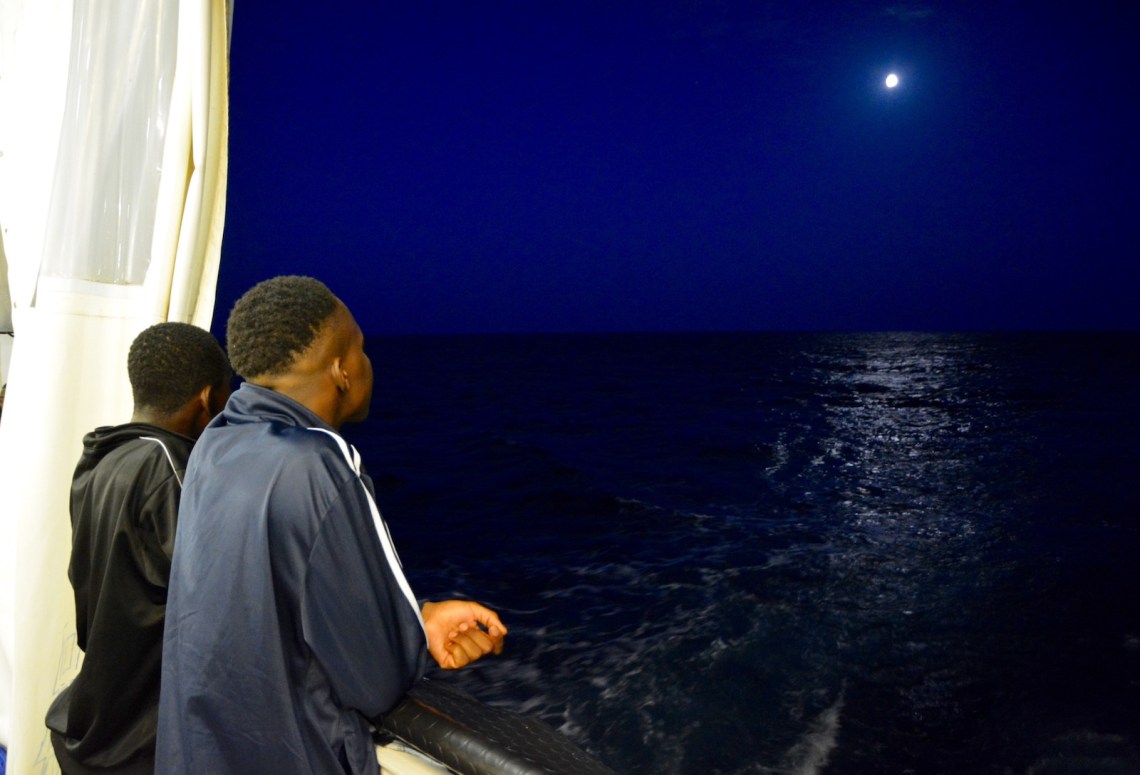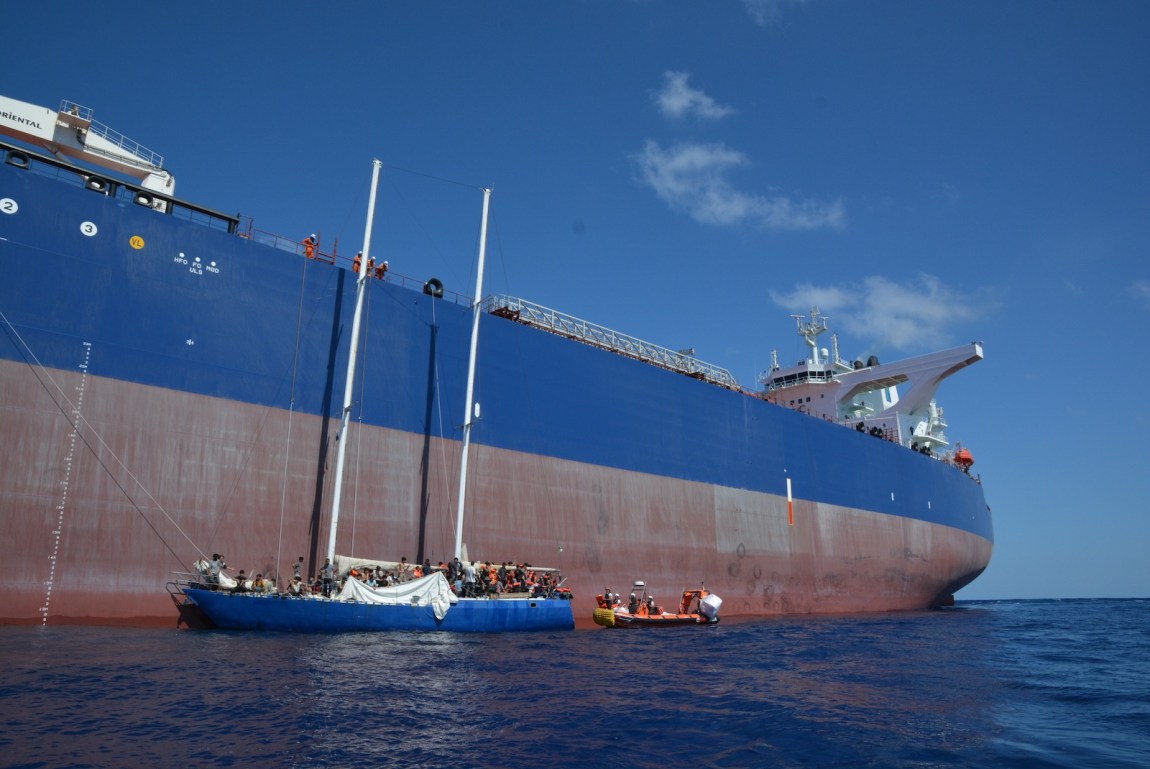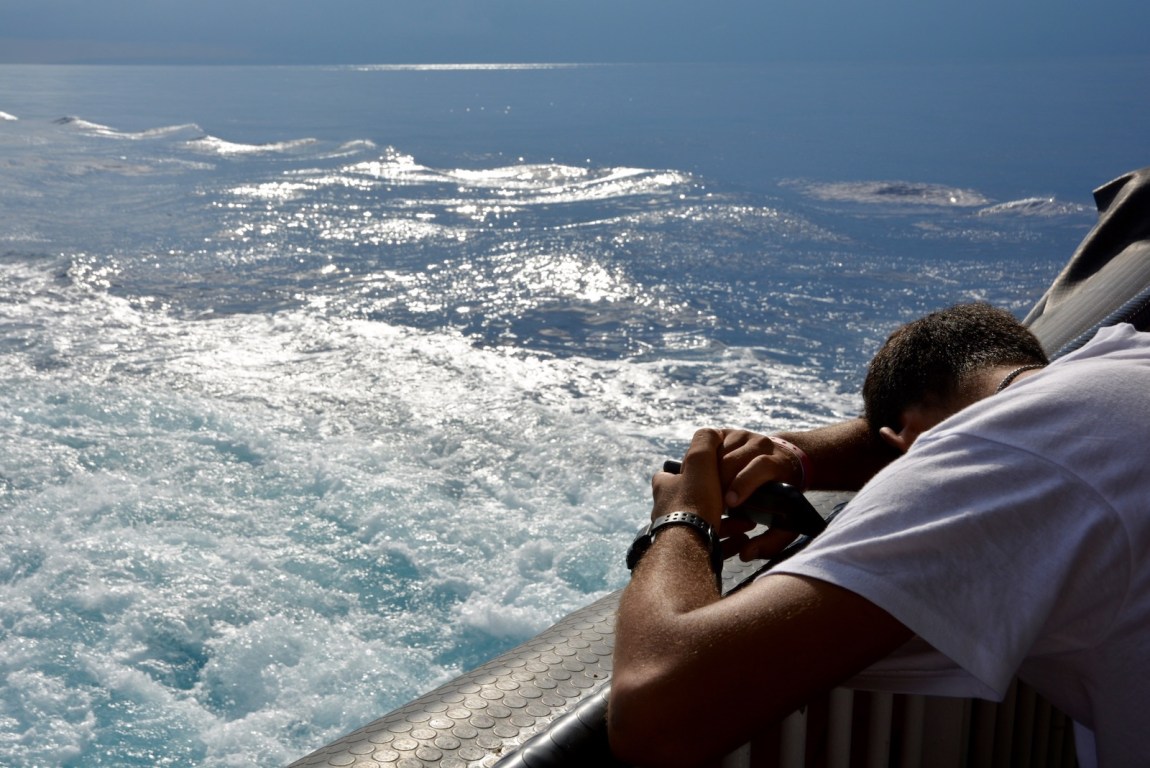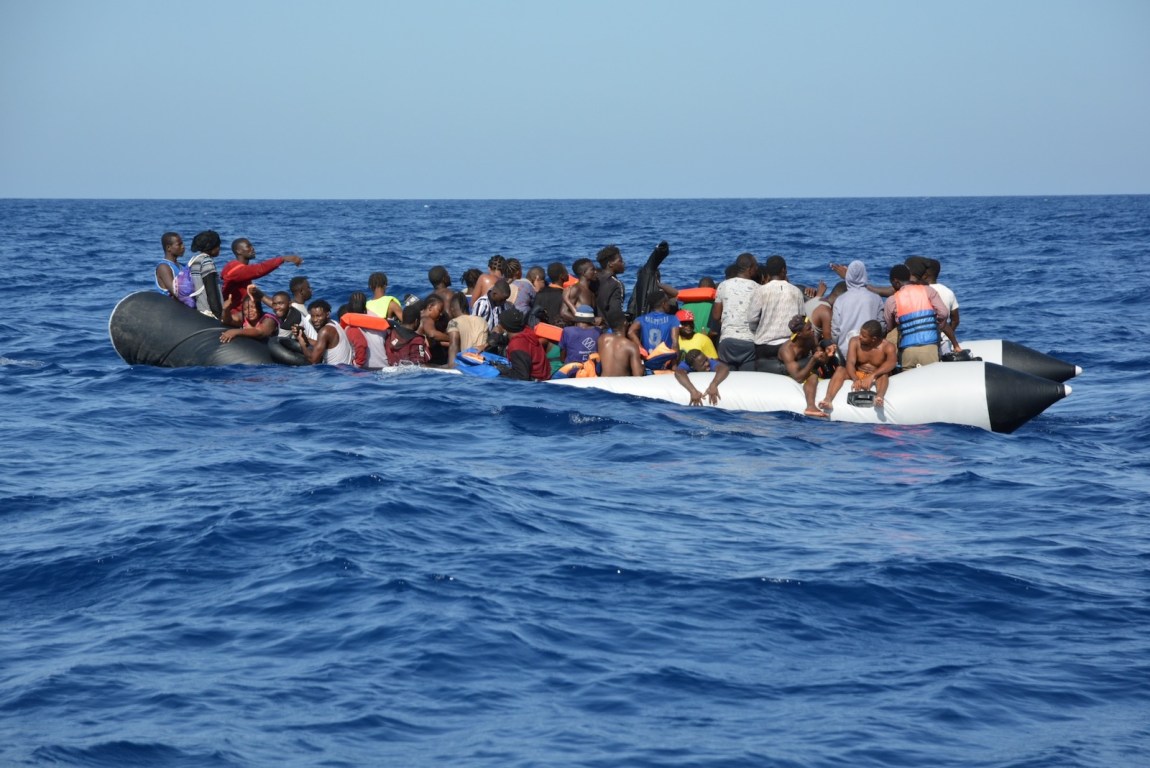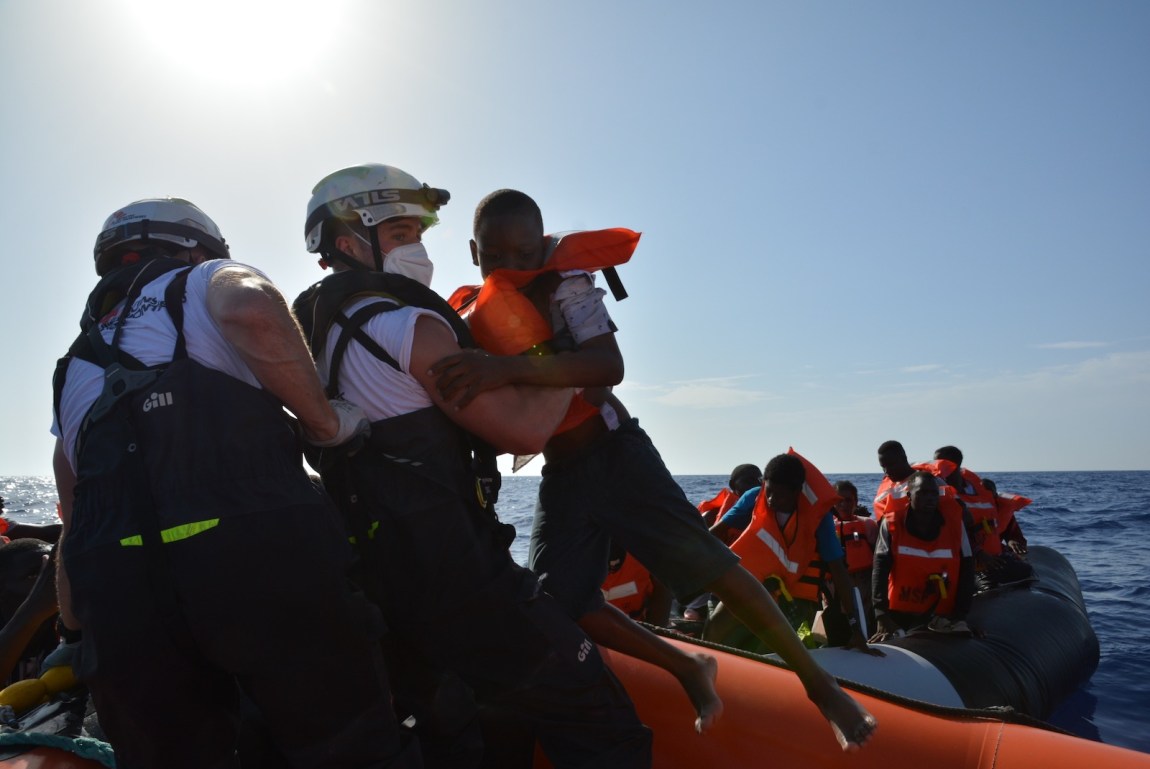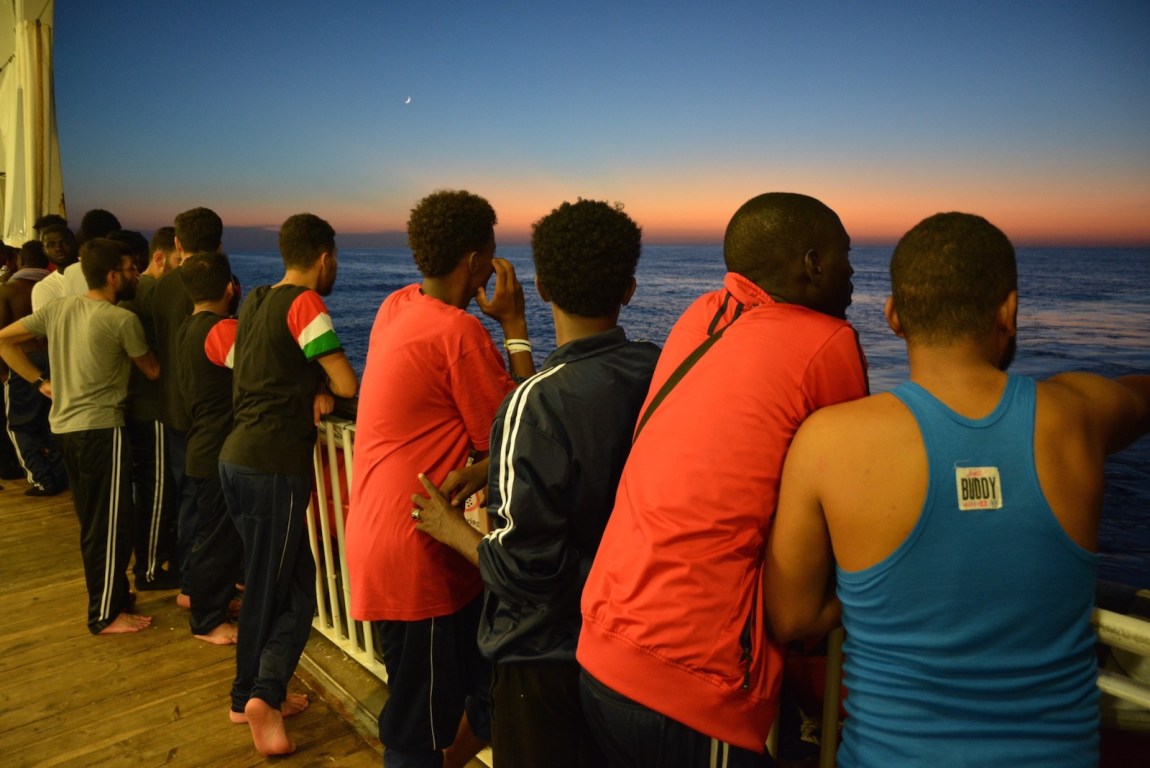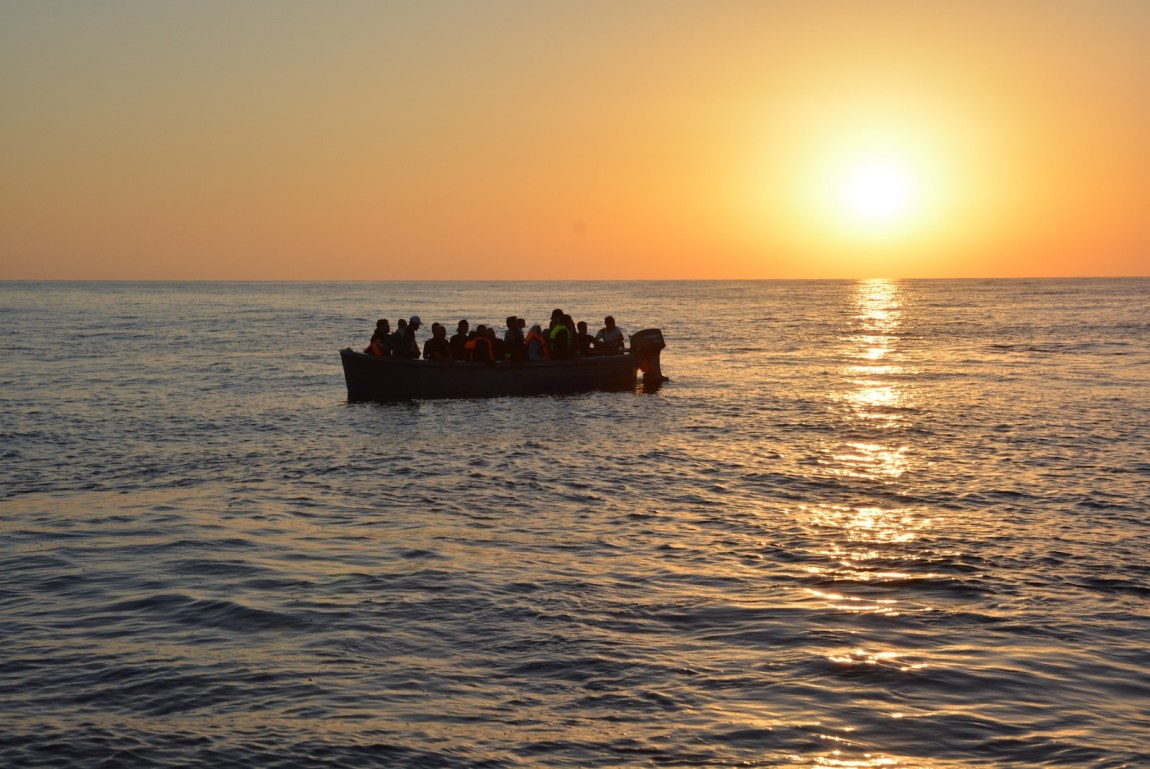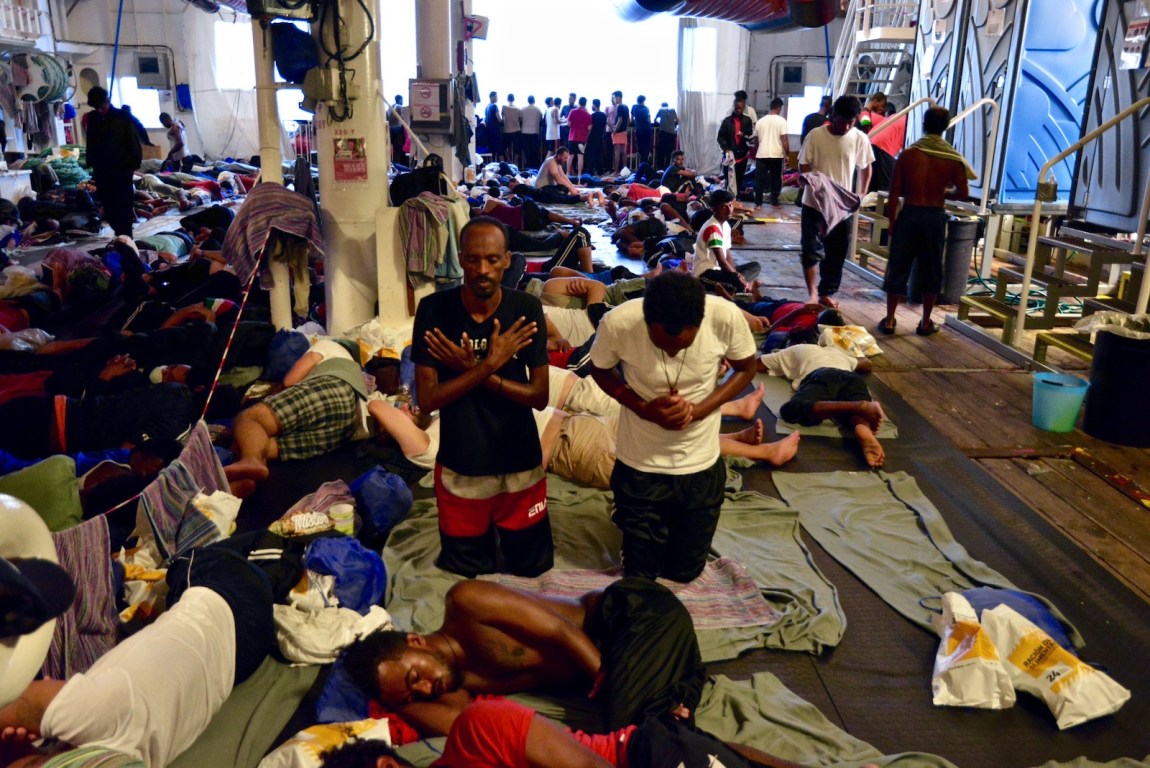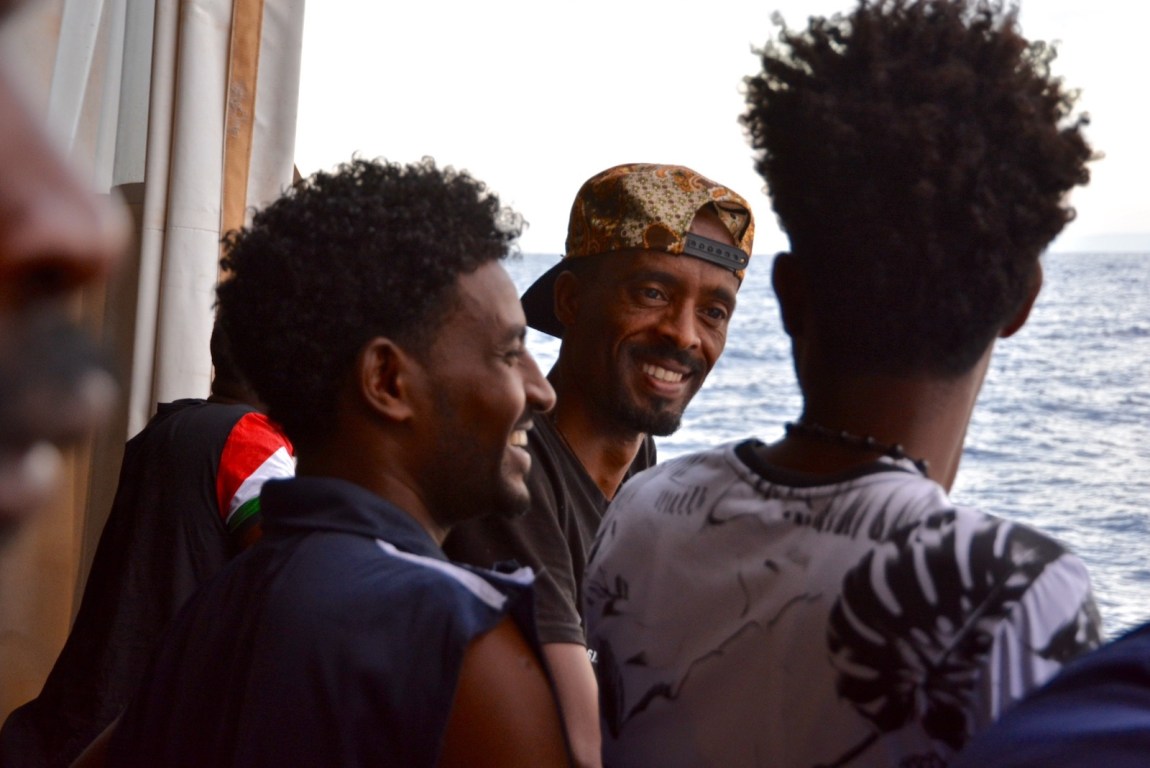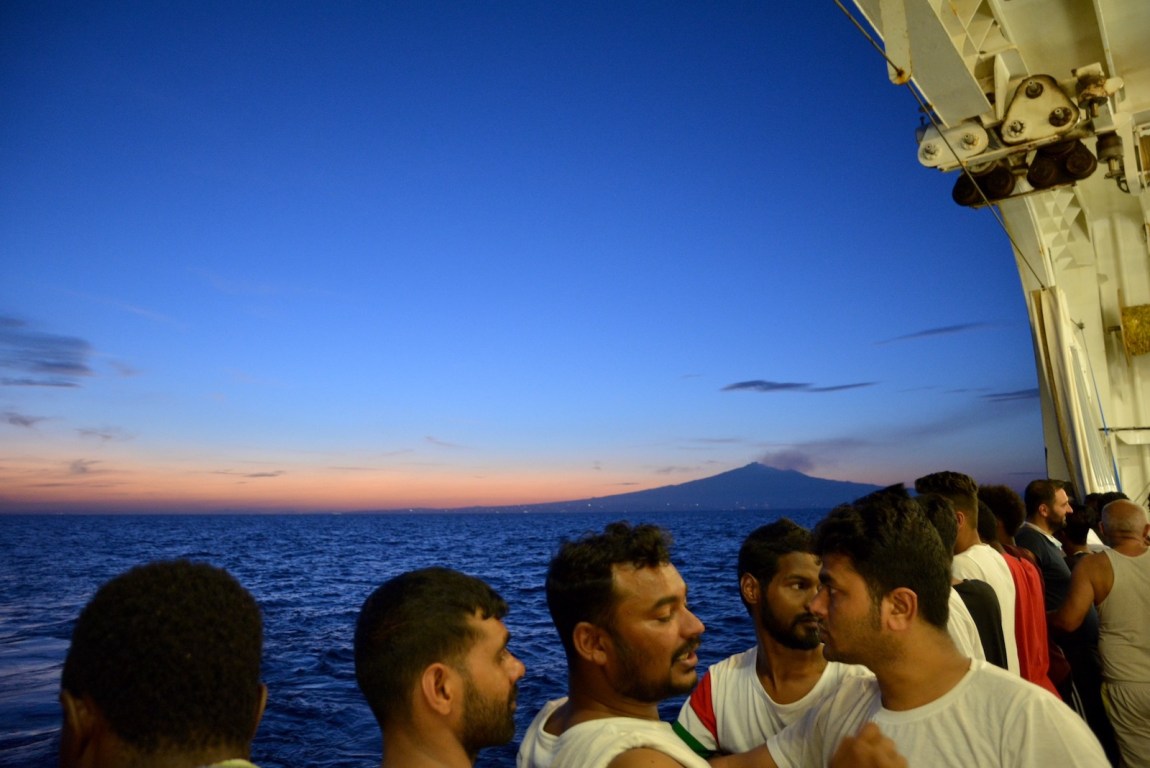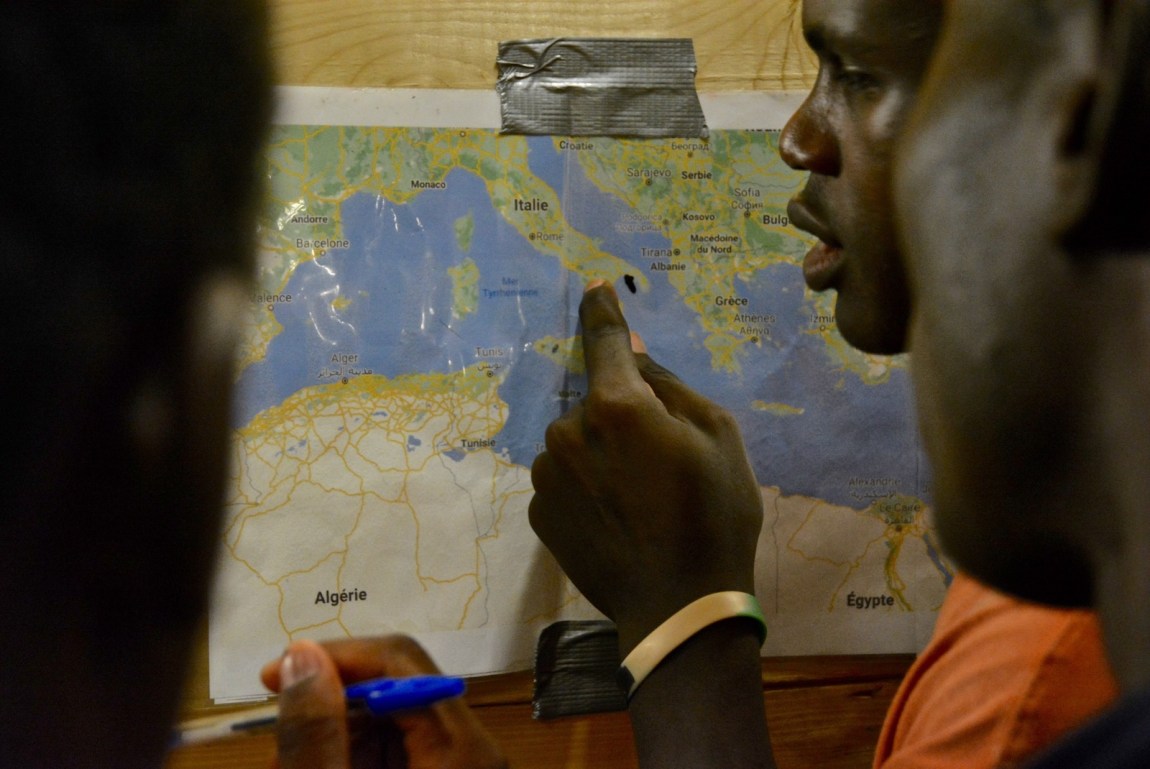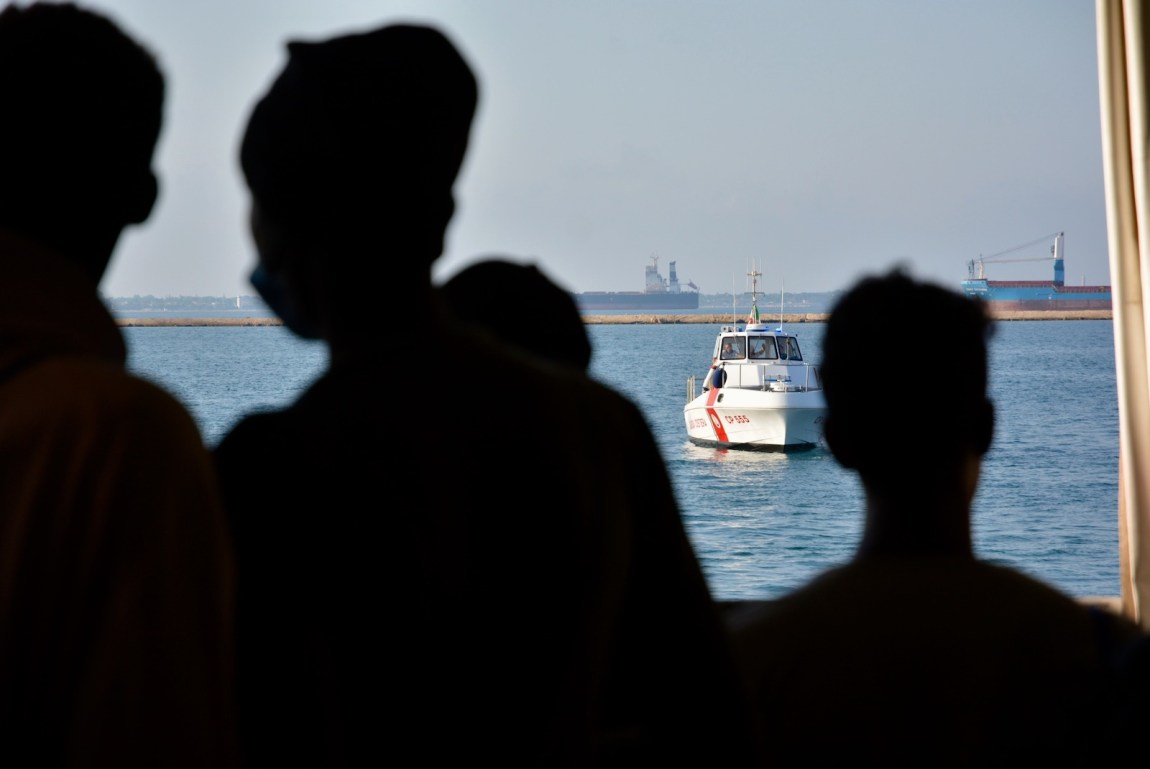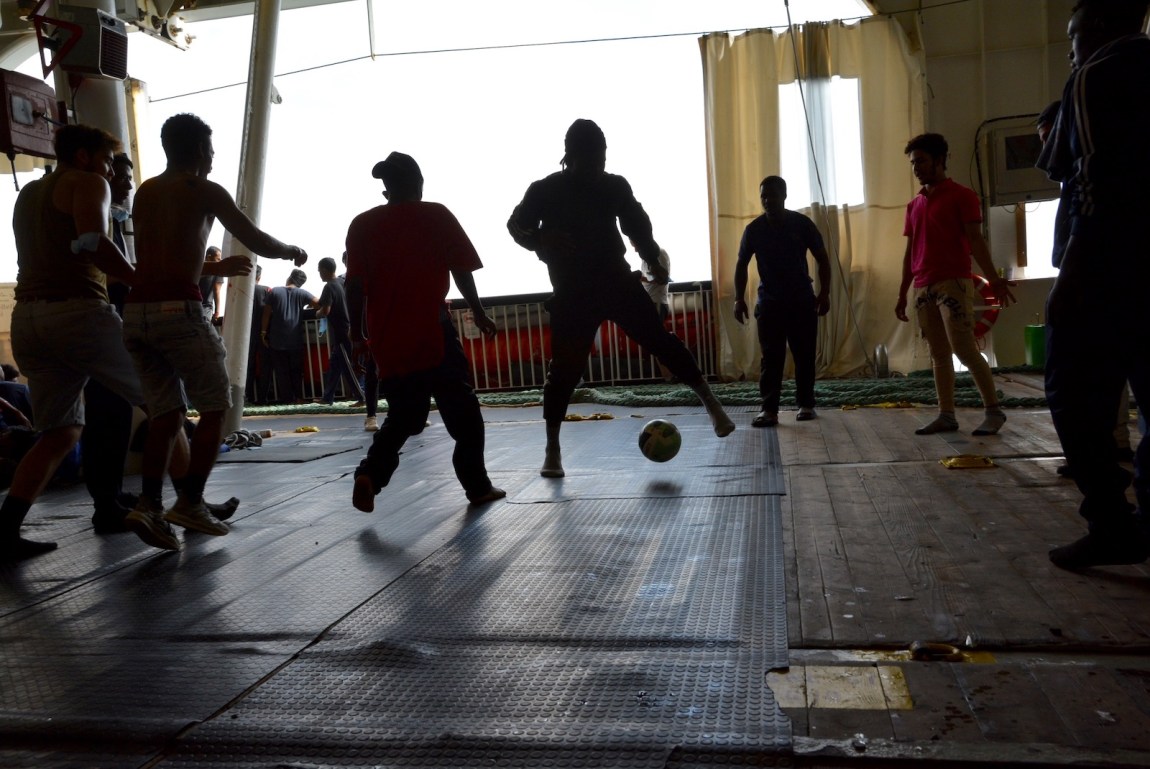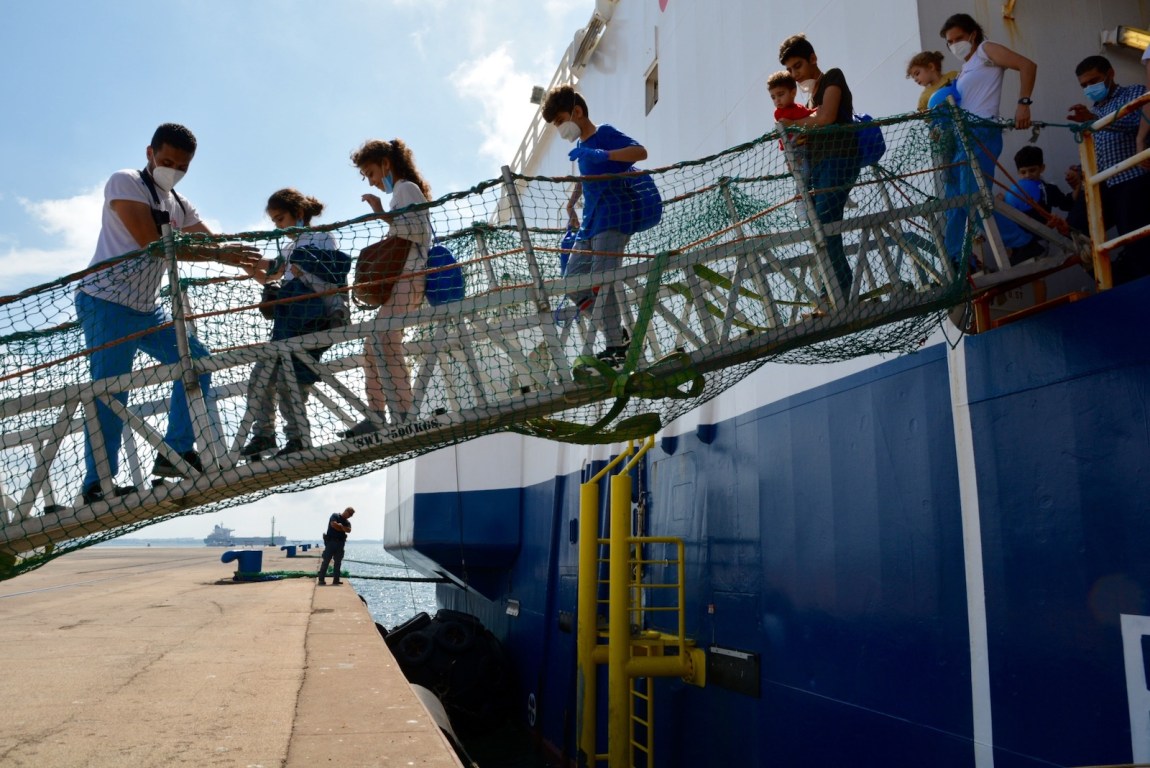Since the election of a far-right government in Italy in September, Europe’s debate over migration has flared up again. Although it has no legal basis for doing so, the new administration in Rome has been trying to impose a naval blockade against NGO vessels rescuing migrants, who continue to board overcrowded boats for the sake of crossing the Mediterranean Sea between Libya and Italy.
Summer, when the sea is calm, is the season of most of the crossings. Last August the two of us boarded the Geo Barents, a rescue vessel run by Médecins Sans Frontières (MSF), also known as Doctors Without Borders, for a “rotation” of an unpredictable duration (most last two to four weeks). What follows are edited versions of our diary entries from those weeks, which were published in French by Libération across three installments between August 28 and September 12.
Jérôme, August 15:
The first thing we were asked, months before boarding the Geo Barents in Sicily, was not to communicate with anyone in Libya while on board. This was not going to be easy. In my humanitarian work, including for MSF, I have visited Libya several times since 2018 and made friends with both migrants stranded there and Libyans—religious and tribal elders, younger activists, medical doctors and aid workers—who try to help them by providing shelter or healthcare in a country where undocumented aliens face detention and violence.
Respecting the rule of no contact with Libya was going to be even more difficult for Khaled, who, although he left Libya and took refuge in the United States in 1979, has close family there. None of our contacts are migrant smugglers, but the caution was justified. In recent years European politicians have targeted migrants and their “helpers.” In Italy, France, and elsewhere, even ministers from the left have accused NGOs of human smuggling. Some rescuers have been arrested. Many suspect that their phones are tapped—as has happened before—and know that anything they say could be used against them.
Khaled, August 16:
At the port of Augusta, an industrial town in eastern Sicily, I submit my passport to immigration. The officer hands it back, tells me I have no Schengen entrance. I leaf through the passport and find several smudged stamps. On the ship the atmosphere is jovial and welcoming. But I’m paranoid, worried that Italian immigration will come back for me. I’m in classic refugee mode, expecting trouble with authorities, even though I’ve been an American citizen for twenty-five years. In all my travels, I’ve never been able to play the role of the detached Western observer. The fact that the people we’ll rescue, if we rescue any, will be fleeing the country of my birth after much abuse weighs heavily on my conscience. How’s my being on this ship helping anyone? Should I apologize to the survivors, simply be grateful to the rescuers?
Jérôme, August 17:
The Geo Barents is Norwegian, named after the Barents Sea in the Arctic, which it navigated as an oil research vessel after its launch in 2007. In 2020 its work halted because of the Covid-19 pandemic. Soon MSF came knocking, seeking to resume its rescue missions in the Mediterranean. On board its old equipment, such as gigantic wheels around which endless plastic pipes are wound, is still visible, but the orange rafts and life jackets have turned the seventy-seven-meter ship into a rescue vessel. According to its Norwegian captain Willy Paulsen, sixty-two, it has a “rescue notation” from Norway’s government for three hundred people in addition to those already on board, and life rafts for six hundred if needed. Since it began operating a year ago, it has rescued 4,180 people.
We wait a few days in Augusta. At the port the air smells of fuel and iron, and the horizon is dotted with the Jurassic silhouettes of metal cranes.
Jérôme, August 18:
Late this afternoon, while a port pilot drove us through the harbor’s narrow exit, we chatted with the Search and Rescue (SAR) team leader, Antonin Richard. A former Greenpeace activist, he was recruited to man a small inflatable rescue boat between Greece and Turkey in 2016, when he was barely twenty-four. After more than a million refugees, half of them Syrian, crossed to Europe in 2015, the European Union signed a deal with Turkey, paying Ankara €6 billion to curb migration. Arrivals from Turkey decreased, but arrivals from Libya rose above 165,000.
Richard then joined a rescue vessel in the Central Mediterranean. Migrant boats departing from Libya, he noted then, were more crowded and in worse condition than in the Aegean. Most rescues in international waters, up to the narrow coastal waters under Libya’s jurisdiction, were done by military vessels under the EU’s Operation Sophia, and a minority by NGOs and commercial vessels. Then the Libyan Coast Guard (LCG), which Operation Sophia began training in October 2016, entered the picture.
Advertisement
When Richard met LCG at sea, they sometimes waited for migrants to be rescued by NGOs before looting their engines. But at Europe’s urging, LCG began to take migrants back to Libya. Once, during a rescue, Richard’s raft was ordered to pull back by an adamant LCG commander, who tied a rope to the migrant dinghy to tow it south, so forcefully that the fragile structure broke and passengers fell overboard. The LCG then abandoned the migrants to the rescuers, who saved 120 lives. Some twenty others went missing. Later, online, Richard recognized that the commander, his thick black hair glistening with gel, had been Abdelrahman Milad, aka “Bija,” head of the Zawiya LCG unit. In 2018 Bija was put on the United Nations list of sanctioned individuals for various abuses, including sinking migrant boats. That did not prevent the EU from training his men.
Formed under the aegis of the UN, the Libyan Government of National Accord had barely set foot in Tripoli when in February 2017 it signed an agreement with Italy. The EU endorsed the deal and channeled €90 million to curb migration in Libya, including speedboats for the LCG.
In the meantime, pressure on NGOs increased. In 2017 Italy began seizing rescue vessels, and in 2018 it started preventing or delaying survivors from disembarking. The International Maritime Organization, lobbied by the EU, recognized Libya’s SAR zone. South of North 34°20’ parallel, Libyan authorities were supposed to coordinate rescues and the LCG was supposed to take migrants back to Libya—even though both the UN and EU kept declaring Libya an unsafe place for migrants to disembark. Commercial vessels, too, began returning survivors they rescued to Libya. Malta also reportedly tasked fishing boats with returning migrant vessels to the south.
In 2019 Operation Sophia ceased its maritime operations, continuing only air patrols, and European planes began calling on the LCG to intercept migrants, even those who had made it north of the Libyan SAR. Then in 2020 the pandemic was used as an excuse to impose fourteen-day quarantines on migrants aboard rescue vessels, slowing down rescues even more—a policy reversed only in early 2022.
The EU perceives its policy in the Central Mediterranean as a success. Arrivals from Libya decreased from 165,000 in 2016 to seven thousand in 2019, and arrivals between 2017 and 2021 combined barely exceeded those of 2016 alone. On the other hand, the rate of migrants returned to Libya increased during the same period from 7 percent to nearly 50 percent. In the past decade, over 20,000 died in the Central Mediterranean.
Khaled, August 19:
This afternoon I put on protective gear and off we go on Orca, a fast rescue boat. Five minutes in, we receive an alert. A boat is in distress ninety minutes away. Our training session becomes a mission.
I’m OK for the first forty-five minutes. Then thirst turns into dehydration, then dizziness. I sit on the floor of the boat, which keeps charging, rising and falling. A Spanish crewman named Joan asks how I’m doing; the French Syrian cultural mediator Félix checks on me in mellow Damascene tones. My eyes lose the horizon. I’m embarrassed, a burden on those saving lives, fading, but my mind is alive.
I hear the word barzakh, the state of in-betweenness. And between consciousness and unconsciousness, I hear those taking the sea telling us that death may be better than the world from which we in rich countries benefit, better than the places they’re fleeing. They’re in a space where the border between life and death is blurred.
And I recall Whitman’s “Out of the Cradle Endlessly Rocking.” Come sweet death, says the grieving bird, come because life involves only danger and pain. But the migrants are also addressing life. “Come snatch me,” they say. The rescue workers barge into this barzakh with ropes, engines, and gear. I hold on to the rope, nearly flat on the boat, in my own melodrama of seasickness.
Back on the ship, my mates assure me that it’s normal, happens to everyone. We didn’t rescue anybody. The Italian Coast Guard took care of the boat in distress.
Khaled, August 20, early morning:
In cabin. Whitman again. It’s the sea’s cradle rocking me. Dip, rise, dip, rise. The room moves in circles, a clockwise motion. The sea, our insomniac mother keeping us awake to ward off her solitude.
And those crammed in shabby boats, with none of the Geo Barents’s comforts, what is the sea doing to them?
Advertisement
Jérôme, August 21:
Unexpectedly, the Italian Maritime Rescue Coordination Center asks us to perform a rescue. The 106 survivors are mostly Afghans who left Turkey five days ago on a small sailboat. In another unusual turn, we are allowed to disembark them in Italy after fewer than twenty-four hours. “It was an uncommon rescue,” Richard comments, “but it’s how it should happen, legally. And it’s how it worked when I began.”
Khaled, August 22:
An image: Yesterday’s sailboat sheltered by the oil tanker, a sea louse on a whale. But inside are more than a hundred people. I’m on the rescue dinghy again. How to describe people gripped by distress? Eyes set outward, horrid scenarios playing in their minds, faces shifting between dread and joy. Samuel, our boat leader, shouts commands. The migrants put on life jackets, hop into our dinghy. Joan hands me a toddler to pass to its mom. We see them safely onto the ship and go to rescue more.
Three passengers refuse to join. Two are string-tall with patches of curly blond hair, one of them with an Orthodox cross tattooed on his left calf. The third is a tanned, chubby man with light-colored eyes. They claim they rescued the Afghans. Within minutes they sail away from us. (Today, we learn these three Belarussians were arrested and jailed in Siracusa.)
Khaled, August 23:
The Afghans are a healthy, mostly young bunch: Shiites, Tajiks, and Hazaras persecuted by the Taliban. Their route is Kabul to Nimruz to Mashhad to Tehran. One presented his Afghan passport at the Iranian border and crossed; others walked for nights and days to slip through the border. Some settled briefly in Iran. Others stayed with smugglers. Through Turkey they huddled in trucks or hid under bus seats. Others traveled to Istanbul with fake IDs. They waited for weeks in crowded basements. Several nights they were told, “let’s go, let’s go,” then “wait, wait, wait.” At last they gathered in a forest near Bodrum and were taken to the boat.
Khaled, August 24:
We disembark the refugees in Taranto. Red Cross, Carabinieri, two big buses, a rescue team, ambulances await them. Temperature check and registration. A young man holds numbered tags next to their faces when they’re photographed. They wave to us from their buses; we wave back. In the afternoon we clean the empty deck and miss them terribly.
Jérôme, August 24:
When they first heard “Taranto,” some hoped it was Toronto, Canada. They leave behind a few Turkish bank notes and coins. During the three days they were on board, we met veterans who fought with the late commander Ahmad Shah Massoud and younger ones who recently defended his Panshir Valley.
We also met Jalal,1 a twenty-eight-year-old engineer from the Hazara minority, and his younger brother, a whirling dervish and painter who showed us photos of dances he took part in—seen as heretical by the Taliban—and his sketches of the Bamiyan Buddhas. Before fleeing he burned his drawings and dervish clothes. Jalal reverently recited thirteenth-century Persian verses by Rumi and Saadi: “In spring no flower grows on stone/Turn yourself into earth so that colorful flowers grow on you.” And: “You who are not sad for the suffering of others/Do not deserve to be called human.”
Khaled, August 25:
Tweets about Libyan interceptions of migrants in the Libyan SAR zone. A slick account, ostensibly run by a man in Perth, Australia! Why are the Libyan authorities and their allies and proxies praising these interceptions? Idealistically, they’re celebrating a functioning security apparatus, convinced they’re protecting their country’s sovereignty and stopping trafficking. Pragmatically, they’re also signaling to the Europeans funding them that they’re doing the work: “If you want interceptions to go on, you must pay for salaries, equipment, and detention centers.”
Finally and most cynically, because the smuggling and interception rackets are often run by the same people, these announcements celebrate the capture of migrants who will end up back in the trafficking pipeline, where they’re frequently extorted, beaten, and placed in forced labor situations—a vicious cycle. All these rationalizations are probably working in tandem within the Libyan anti-smuggling units. This mix of national pride, Machiavellianism, and criminality is Qaddafi’s legacy, which still permeates the Libyan state.
Most Libyans don’t question the subject of migrants or the violence of the trafficking world. They spend most of their time trying to make an income; or get access to their money, which is locked up in cashless banks; or secure enough gasoline for their cars and the generators they’ve bought for the relentless power cuts. Those who can afford it hire an African stay-at-home servant for $200 a month.
Khaled, August 26:
At a training session preparing the team for different rescue scenarios, we watch a video clip recorded by a reconnaissance plane. An LCG boat swerves around a refugee vessel, threatening to crash into it. It’s madness and criminality. The plane’s pilot shouts at the LCG boat, “So-called Libyan Coast Guard, please keep more distance!” The appellation “so-called” stings me. Why not call them bastards or motherfuckers, like you would people endangering others? But that’s Western humanism for you. Always a slight dig to show who’s more human.
Jérôme, August 26:
We enter the Libyan SAR zone, from where migrants are often brought back to Libya. Before sunset, a tiny dot of light on the horizon. Crewmen preparing the rescue dinghies disagree:
“I bet it’s just Libyan fishermen…”
“Better be cautious!”
Khaled, August 26:
It was a small boat with eleven migrants. They were almost intercepted by a speeding LCG or militia boat that arrived just as the rescue wrapped up.
Jérôme, August 27:
Sunrise. Is it the same Libyan boat? It bears a flag with black wings, similar to that of the Stability Support Apparatus, a loose coalition of militias, supposedly controlled by the internationally recognized Tripoli government, which has had an increasing part in intercepting migrants. As they can guess we’re observing them with binoculars, a man on their bridge puts on a khaki mask.
We are thirty-three nautical miles (61 km) off the Libyan coast, and we cautiously change course northward. From the bridge Libya is a terra incognita, from which dangerous boats often approach. The line—already difficult to discern on land—between the casual policeman seeking his morning coffee and the predatory militia, or between the classical smuggler and the pirate, is invisible at sea.
Khaled, August 27:
Another sunset rescue: twenty-five Syrians, including one woman. This is going to be my last shift on the dinghy.
In Tripoli the government elected by a parliament whose legitimacy is questioned is trying to topple the government appointed by the UN, whose mandate has expired. Thirty-two dead, 144 wounded.2 The Libyan oil rigs are beacons in the dark sea. The sight of my nation’s flickering wealth in the midst of all this smuggling, while the nation’s capital burns, breaks my heart.
Jérôme, August 27:
The oil rigs are guideposts for migrants heading north. Salah, a thirty-year-old Libyan whom we rescued with ten migrants from three other countries, once worked on one of them. He decided to leave Libya after being jailed and tortured by a militia from a rival tribe. “God wanted to keep me alive, but staying alive in Libya exhausted me. There was no choice but the sea.” On Facebook he found a smuggler with a good cover: “I just sell you the boat. What you do with it is your business,” he told the migrants. He sounded like the boat merchant in one of Khaled’s poems, telling his wife that people have always (“even before the Romans”) traveled by sea and that some survive while others don’t—“the sea sends back the drowned.”
“Everybody wants to leave Libya, Libyan or foreigner,” says Salah. “Other passengers were not surprised to see me. Yes, foreigners are treated the worst in Libya. Libyans know this and can’t say anything. People are afraid of the kidnappers, afraid they’d be kidnapped too. I hate Libya now, there’s no life in it.” He says that after their engine sputtered out, they drifted for two days. Some hoped to be rescued even by Libyans, others were ready to jump overboard and die if they saw a Libyan boat. Migrants paint each attempt at crossing as a throw of the dice. At sea, it’s black and white: life or death, Libyan “hell” vs. European “paradise.” Further south, on land, it’s grey: years spent between life and death.
At night, in my windowless cabin near the bow, I hear the waves, the engine’s roar, and metallic clanking, and wonder if I’m missing something outside. Suddenly the radio shouts: “Be ready for rescue!”
Khaled, August 28:
3:30 AM. Rescued a boat of sixty-one, a mix of people coming from Zuwara, twenty-one children. Did not participate in the rescue. Helped register migrants, settle them in. Picked up trash. Cleaned the toilets.
4:00 PM. Rescued a Zodiac with seventy-nine people, mostly West Africans, a jubilant, rowdy young crowd. I place yellow plastic bracelets around the wrists of fifteen youngsters to indicate that they are unaccompanied minors. Something had made me hesitate, but I do tell everyone that I’m from Libya. Some are surprised, others take it in stride.
Jérôme, August 28:
One side of the Zodiac was deflated. Some passengers had innertubes around their waists, one together with a child’s unicorn inflatable. “They wouldn’t have lasted long,” a rescuer comments. We distribute life jackets, some celebrate, clap, splash seawater in the air, point to the sky and say, “It’s God!” Some want to be first, call others “son of a bitch.” A seasoned rescuer suggests a magic sentence: “Calm down or we leave you here.” Rescue is sometimes tough, he acknowledges.
When pulled into our dinghy, some survivors look like inert bodies. Others docilely follow orders. In Libyan detention centers they got used to sitting in line, wedged between each other’s legs. “I don’t want to go back to Libya,” a woman cries out. A rescuer stabs the rubbery wreck so it can’t be used again and scrawls “MSF” on it with spray paint to signal to anyone sailing past that its passengers were rescued.
Jérôme, August 29:
Like many others, Anei, a refugee from war-torn South Sudan, says that as soon as he entered Libya in 2018 he was handed over to traffickers who told him he’d been “sold” and had to pay €1,000 to be released. Videos of his torture were sent to relatives until the money was transferred.
As interceptions increased, so did attempts to cross. Anei tried to cross the sea six times. Because he speaks English he was often chosen as the boat’s “compassman,” in charge not only of the compass but of a GPS and a Thuraya satellite phone. When the boat was in distress, preferably outside of the Libyan SAR zone, he would ring Alarm Phone, a hotline whose volunteers then alert the relevant rescue centers and vessels. (Most of the rescues we did were thanks to Alarm Phone.) As compass, he rode for free. The first five times, he was intercepted by the LCG and sent to prison.
A Cameroonian going by the name of Black Simon entered Libya in 2017, had twelve stays in eight different detention centers, and attempted to cross seven times. “Europe has the right not to want migrants. But I have the right to tell Europe it’s not good in my country and I need help, safety, and protection,” he tells me.
At sunset we rescue eighteen Syrians and Egyptians. An EU fishery inspection vessel was on site long before and stayed to observe the rescue. We called to them several times. They didn’t respond.
Jérôme, August 30:
After seven rescues, we now have on board 267 survivors from eighteen countries, from Senegal to Bangladesh. We send the Italian authorities a request for a “place of safety,” as defined by maritime law.
Giorgia Meloni, the neofascist frontrunner to become Italy’s next leader, calls for a naval blockade against vessels rescuing migrants. Will that political climate delay us from being granted the port we asked for? All on board, not least the two Italians among us, expect things to get worse soon.
A message from Jalal, one of the Afghans we disembarked in Taranto on August 24: “We still are in Taranto. It’s about 5 days that they kept us here in police station, they didn’t ask any question, they just took our fingerprints. I don’t know why? Nobody wanna stay in Italy.”
Khaled, August 31:
Florian, our physician, and I like to talk about the big picture. An Afghan family paid $40,000 and a Syrian lady paid $10,000 on their first and only crossings. These are the lucky ones. Most migrants try several times; they pay a smuggler and when caught bribe the jailer, again and again.
Officially there are about 650,000 migrants in Libya. Most of them don’t take to the sea. Florian asks, “Why should Libya stop the flow when it makes money from it?” But it’s not that simple. Libya is a difficult place: salaries unpaid for months; 20 percent unemployment (50 percent among the youth); GDP per capita dropping to 40 percent of what it had been ten years ago; easy access to guns, which has led to an increase in violent crime in the last decade; a weak state ruled by militias who imprison, torture, and disappear fellow citizens with impunity. Under normal conditions in stable countries migrants are good for an economy, but Libya’s illegal trafficking market can only have damaging effects on society.
The EU has spent €700 million to support Libya since 2015, according to an official report. In 2022 it has budgeted €754 million on Frontex, its Border and Coast Guard Agency. Its 2021–2027 budget for managing borders and fighting migration is €22.7 billion, and individual European nations have their own anti-immigration funds. The vast majority of this money is going to Europeans in the public and private security sector. Meanwhile many Europeans feel burdened by immigration and see Libya as the violent bogeyman. Yet European economic and anti-immigration policies share the responsibility for the survivors’ hardship. It’s Europe’s money that’s sustaining the status quo.
Jérôme, August 31:
He’s also a Christian from Cameroon, but let’s call him Yusuf, the Arabic name he took in Libya, like many others, to avoid being treated worse because of his religion. “You, like that,” he says, pointing to my white skin. “You can’t know the difficulties we’re going through. I stayed so long that when I looked behind I saw that it was the same risk of ending up in prison when you go home as when you go to sea. Better to move on.”
To Khaled, he says: “You’re Libyan, you know these realities, what are you doing to change them?”
Khaled, August 31:
Yusuf was surprised when I told him I’m from Libya, perhaps even a little upset. When he asked me what I was doing about the situation there, I asked him back, “What can one person do to change this enormous problem?”
I also asked him why he stayed on rather than going back to Cameroon. He responded that at some point staying in Libya and going back to Cameroon became the same. It is not in their best interest to say this when applying for asylum, but many of the migrants who cross the water stay in Libya to make money for the crossing. That was what Yusuf did. And when they fail, and when they’re out of detention, they work again to cross one more time. Work conditions are abusive in Libya. Foreign workers often go unpaid or underpaid. Many are regularly robbed at gunpoint. But there’s still money to be made.
We never get around to this question: Why are conditions so bad in Cameroon? Who but the West continues to squeeze Africa’s people with debt and siphon all their natural resources? Is there no leverage against Isaias Afwerki to stem the tide from Eritrea? Can the West do nothing but build more and more refugee camps?
Jérôme, August 31:
In most Libyan detention centers, survivors say, one only has to pay to get released. But it’s more difficult in those prisons whose aim is to show the EU they’re doing the job. They don’t necessarily receive European money but believe that the more detainees they hold, the better their chance to get funded. Jackson, another Cameroonian, remembers when he offered money to the jail’s director. It was the first time he saw the man smiling. Then the director responded, “We don’t need your miserable money. Our target is the EU. The ransom the EU can give us, you can’t give us.” Jackson saw they were already rich enough. “They’re driven around in big brands: Tundra, Prado.”
Khaled, September 2:
We travel under a “yellow flag,” meaning that, once in Europe, officials need to verify that we are disease-free. Otherwise, we’re quarantined. On the ship, the migrants are separated from us. We have to put on work outfits to meet them, and these clothes must not enter our clean environment. The migrants’ meals come in individual ration bags. They use portable toilets and take bucket showers. They sleep on wafer-thin rubber rugs on deck. And they wait, and wait, and wait, day after day.
Jérôme, September 2:
Migrants on board the Geo Barents want to communicate with their families. “They think we’re dead,” a Syrian lady pleads. “We can’t provide Internet” is the standard answer. True, the connection is too weak for everyone on the ship to use it. But there’s also the fear that survivors will call smugglers to whom they owe money, which could backfire on the rescuers.
At sea, South Sudanese befriend Moroccans and Cameroonians befriend Syrians. They keep together, putting arms on each other’s shoulders. Some even hope to continue the journey together from Italy to other European countries where they have relatives. Many don’t want to stay in Italy and aim for Germany or France. They call Europe “the Promised Land.”
On board, another distinction begins to blur: between the ideal war refugee and the “economic migrant” looking for a better life. The refugee, it’s implied, should just run for his life. He’s not supposed to have projects or dreams. A kid going by the nickname “Player” wonders if he should hide the fact that he didn’t only escape a dictatorship but is also following the path of a former football clubmate who turned professional in Germany. “When I see him on TV, it hurts,” he whispers. “He was flown to Europe as a child, didn’t have to cross the sea.”
Khaled, September 4:
An MSF staff member says, “Every time I interview a survivor, I feel like I stole something.” We were both nearly in tears by then, hearing again and again about beatings, insults, cruelty, humiliation. One can only take so much. But you develop a thick skin. You begin to ask questions to test a thesis, or to verify information you knew. You find yourself comparing cases: that one had it easy, this one is really tough. And before long you’re wearing the immigration officer’s hat. “This one has a case, that one no chance.”
Survivors tell us, “I want to follow my dreams, Europe is the place to fulfill them.” Or, “I want to be a humanitarian like you!” But some get jaded. They recognize that you’re benefiting from this work, that their misery is the raw material for many professional careers. With this article, I too have joined the illegality biz.
Jérôme, September 6:
In order to leave their country—often authoritarian regimes or countries at war where the very act of leaving is a crime—refugees first need to locate a smuggler. Some smugglers just know how to cross one border, others can organize the whole trip up to Europe, through networks with intermediaries along the way.
When we ask about the smugglers, we hear curses for the bad ones and praise for the good (or less bad) ones. Bad “pushmen” leave with the money or sell passengers to the Coast Guards. Good ones give rigid boats rather than inflatable ones, not overloaded, with working engines, GPS, Thuraya, and enough fuel to reach Europe. On smartphone apps, they monitor the weather and presence (or absence) of possible rescue vessels. They bribe the Coast Guards to look elsewhere, and if their passengers are jailed, they may pay to release them and even give them another chance for free. They may train captains and compass holders among their passengers, and those may ride free. One passenger had never seen the sea but was chosen as captain for his experience on a river in the Horn of Africa. In that region, the Arabic word bahr (“sea”) is sometimes used for rivers that are barely permanent. The onetime captain still calls the Mediterranean “the river.”
Once he was arrested by a Coast Guard officer who told him, “I’m a pushman also, working in the river. I’ll take you as captain.” That “good pushman” escorted his passengers for four hours.
Anei: “In the end, it’s luck. I failed with good smugglers and succeeded with a bad one.”
Khaled, September 6:
The deck is roiling. Some survivors approach me. They’re tired of waiting, their bodies aching from the hard floor. They hate the food. And they’re out of cigarettes, no phone, no Internet. “All you tell us is drink water, water, water, and go to sleep.” I say, “Yes, but it’s not in our hands, there’s really nothing else to do.” Explanations get twisted. Some stage a hunger strike. There are whispers about swimming to Sicily. “Come on, you guys, stop this crazy talk.” Near the sink there’s a quick scuffle. It’s broken up in no time. Things calm down eventually.
Khaled, September 7:
When our team leader announces that we are authorized to disembark in Taranto, joy erupts on deck. The West Africans lead, chanting in a call-and-response. The Syrians take their turn. Clapping and whistling and howling. People hug again and again. People who had complained to me earlier rush to hug me. “Thank you,” they say, “Forgive us.”
Jérôme, September 9:
Taranto again. A “place of safety”? What will happen to those we disembark? Jalal and his Afghan mates whom we dropped on August 24 are not around anymore. After a week they staged a protest and the Italian authorities let them go. Jalal is now in Germany and sends his greetings over WhatsApp.
Jérôme, February 4, 2023:
The new Italian government took office in October and immediately launched its assault on NGO vessels. In November, it attempted to take only the sickest of 572 survivors aboard the Geo Barents, before giving up and allowing them all to disembark. On January 2 it issued a decree aimed at obliging rescue vessels to go to a port after each rescue, likely abandoning other boats in distress.
On January 24, back at sea, the Geo Barents rescued a boat in distress with sixty-nine people on board. Italy immediately assigned La Spezia—on the Italian riviera in the very north of the country, a hundred hours of navigation away—as a port to disembark the survivors. The next day, as had been feared, the Geo Barents met two other boats in distress in a row on its way north and rescued both. In doing so it was complying with international law but showing that the new Italian decree was not implementable and risking heavy fines, even the detention of the ship. On January 29, the 237 survivors were disembarked in La Spezia without more trouble. The day before Meloni had been in Tripoli promising the Libyan Coast Guard five new boats, to be funded by the European Union. On February 2, Italy renewed its Memorandum of Understanding on Migration with Libya.
Quick calculation: in 2022, the Geo Barents rescued 3,843 people on fifty-nine boats in distress. With the new decree, it would have rescued only fourteen boats, with 1,033 on board. Do numbers matter more than people to the police officers I met in Taranto—like the one with his Panama hat, beige polo shirt, and white pants, which looked more like a summer outfit than an office one? Will a change in government be enough to convince them to disregard the laws they’ve been taught?


